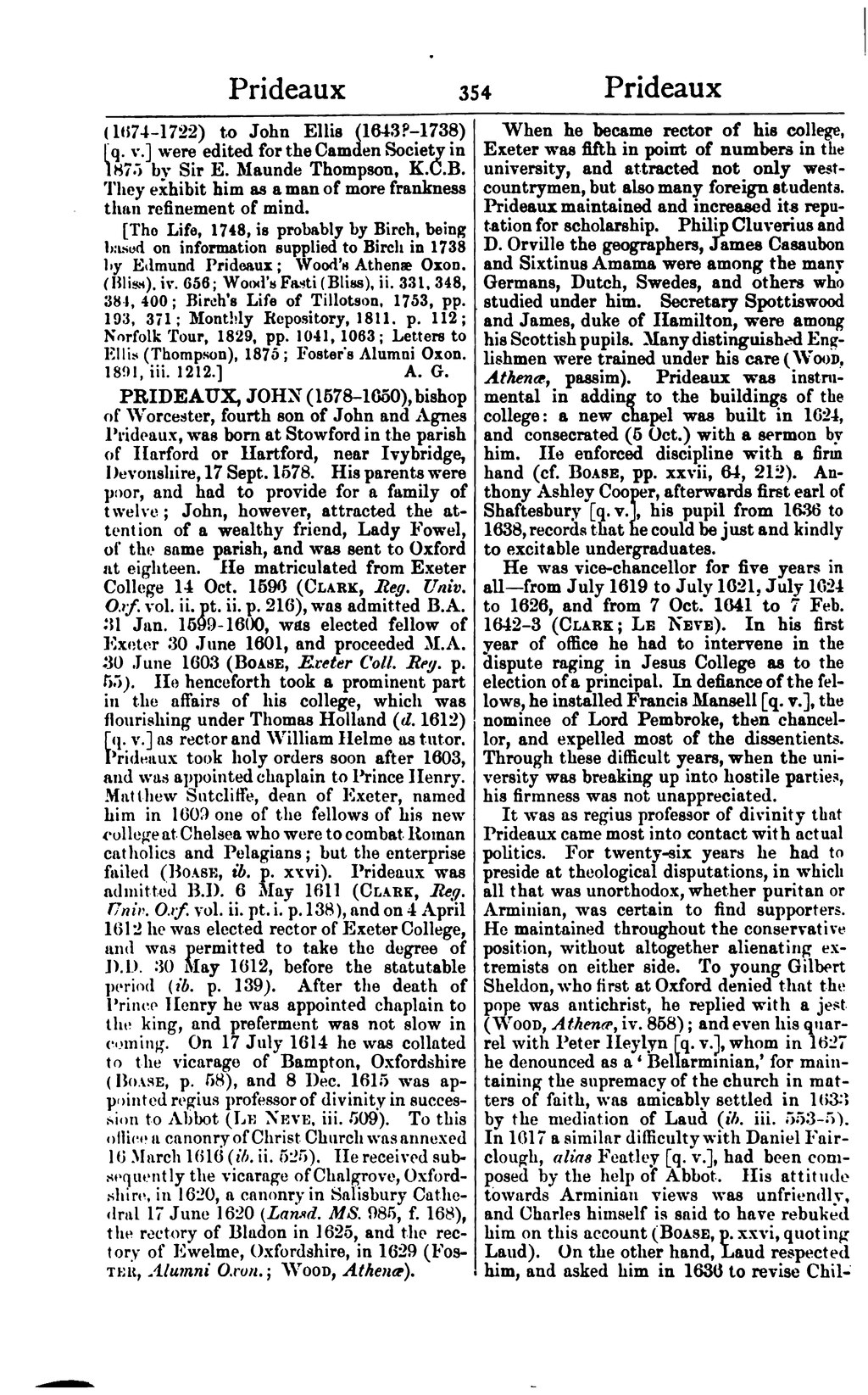(1674–1722) to John Ellis (1643?–1738) [q. v.] were edited for the Camden Society in 1875 by Sir E. Maunde Thompson, K.C.B. They exhibit him as a man of more frankness than refinement of mind.
[The Life, 1748, is probably by Birch, being based on information supplied to Birch in 1738 by Edmund Prideaux; Wood's Athenæ Oxon. (Bliss), iv. 656; Wood's Fasti (Bliss), ii. 331, 348, 384, 400; Birch's Life of Tillotson, 1753, pp. 193, 371; Monthly Repository, 1811, p. 112; Norfolk Tour, 1829, pp. 1041, 1063; Letters to Ellis (Thompson), 1875; Foster's Alumni Oxon.]
PRIDEAUX, JOHN (1578–1650), bishop of Worcester, fourth son of John and Agnes Prideaux, was born at Stowford in the parish of Harford or Hartford, near Ivybridge, Devonshire, 17 Sept. 1578. His parents were poor, and had to provide for a family of twelve; John, however, attracted the attention of a wealthy friend, Lady Fowel, of the same parish, and was sent to Oxford at eighteen. He matriculated from Exeter College 14 Oct. 1596 (Clark, Reg. Univ. Oxf. vol. ii. pt. ii. p. 216), was admitted B.A. 31 Jan. 1599-1600, was elected fellow of Exeter 30 June 1601, and proceeded M.A. 30 June 1603 (Boase, Exeter Coll. Reg. p. 55). He henceforth took a prominent part in the affairs of his college, which was flourishing under Thomas Holland (d. 1612) [q. v.] as rector and William Helme as tutor. Prideaux took holy orders soon after 1603, and was appointed chaplain to Prince Henry. Matthew Sutcliffe, dean of Exeter, named him in 1609 one of the fellows of his new college at Chelsea who were to combat Roman catholics and Pelagians; but the enterprise failed (Boase, ib. p. xxvi). Prideaux was admitted B.D. 6 May 1611 (Clark, Reg. Univ. Oxf. vol. ii. pt. i. p. 138), and on 4 April 1612 he was elected rector of Exeter College, and was permitted to take the degree of D.D. 30 May 1612, before the statutable period (ib. p. 139). After the death of Prince Henry he was appointed chaplain to the king, and preferment was not slow in coming. On 17 July 1614 he was collated to the vicarage of Bampton, Oxfordshire (Boase, p. 58), and 8 Dec. 1615 was appointed regius professor of divinity in succession to Abbot (Le Neve, iii. 509). To this office a canonry of Christ Church was annexed 16 March 1616 (ib. ii. 525). He received subsequently the vicarage of Chalgrove, Oxfordshire, in 1620, a canonry in Salisbury Cathedral 17 June 1620 (Lansd. MS. 985, f. 168), the rectory of Bladon in 1625, and the rectory of Ewelme, Oxfordshire, in 1629 (Foster, Alumni Oxon.; Wood, Athenae).
When he became rector of his college, Exeter was fifth in point of numbers in the university, and attracted not only west-countrymen, but also many foreign students. Prideaux maintained and increased its reputation for scholarship. Philip Cluverius and D. Orville the geographers, James Casaubon and Sixtinus Amama were among the many Germans, Dutch, Swedes, and others who studied under him. Secretary Spottiswood and James, duke of Hamilton, were among his Scottish pupils. Many distinguished Englishmen were trained under his care (Wood, Athenae, passim). Prideaux was instrumental in adding to the buildings of the college : a new chapel was built in 1624, and consecrated (5 Oct.) with a sermon by him. He enforced discipline with a firm hand (cf. Boase, pp. xxvii, 64, 212). Anthony Ashley Cooper, afterwards first earl of Shaftesbury [q. v.], his pupil from 1636 to 1638, records that he could be just and kindly to excitable undergraduates.
He was vice-chancellor for five years in all from July 1619 to July 1621. July 1624 to 1626, and from 7 Oct. 1641 to 7 Feb. 1642-3 (Clark; Le Neve). In his first year of office he had to intervene in the dispute raging in Jesus College as to the eleption of a principal. In defiance of the fellows, he installed Francis Mansell [q. v.], the nominee of Lord Pembroke, then chancellor, and expelled most of the dissentients. Through these difficult years, when the university was breaking up into hostile parties, his firmness was not unappreciated.
It was as regius professor of divinity that Prideaux came most into contact with actual politics. For twenty-six years he had to preside at theological disputations, in which all that was unorthodox, whether puritan or Armiuian, was certain to find supporters. He maintained throughout the conservative position, without altogether alienating extremists on either side. To young Gilbert Sheldon, who first at Oxford denied that the pope was antichrist, he replied with a jest (Wood, Athenae, iv. 858); and even his quarrel with Peter Heylyn [q. v.], whom in 1627 he denounced as a 'Bellarminian,' for maintaining the supremacy of the church in matters of faith, was amicably settled in 1633 by the mediation of Laud (ib. iii. 553-5). In 1617 a similar difficulty with Daniel Fairclough, alias Featley [q. v.], had been composed by the help of Abbot. His attitude towards Arminian views was unfriendly, and Charles himself is said to have rebuked him on this account (Boase, p. xxvi, quoting Laud). On the other hand, Laud respected him, and asked him in 1636 to revise Chil-
